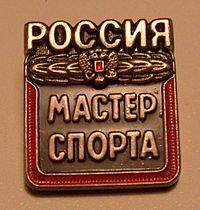- Unified Sports Classification System of the USSR and Russia
-
Unified Sports Classification System of the USSR (Russian: Единая Всесоюзная спортивная классификация) is a document which provided general Soviet physical education system requirements for athletes. The classification was established in 1935 and was based on separate classifications, which existed for several sports disciplines before. Since 1949 it was revised every four years, the period, which corresponded to the Olympic cycle, to reflect new standards for the physical training. The document contained test standards, principles and conditions, necessary for the conferment of sports ranks and titles, for all sports, cultivated in the USSR.
As of the 1970s, there were following ranks for athletes of the USSR (listed in descending order of value):
- Merited Master of Sport of the USSR, (Russian: заслуженный мастер спорта СССР, abbreviated as "змс", sometimes translated as Honoured Master of Sport of the USSR), equates to international champion who has made valuable contributions to the sport
- Master of Sport of the USSR, International Class (Russian: мастер спорта СССР международного класса; abbreviated as "мсмк"), equates to international champion
- Master of Sport of the USSR (Russian: мастер спорта СССР; abbreviated as "мс"), equates to national champion
- Candidate for Master of Sport of the USSR (Russian: кандидат в мастера спорта СССР; abbreviated as "кмс"), equates to nationally ranked player
- First-Class Sportsman (Russian: спортсмен 1-го разряда), equates to regional champion
- Second-Class Sportsman (Russian: спортсмен 2-го разряда), equates to state champion
- Third-Class Sportsman (Russian: спортсмен 3-го разряда), equates to city champion
- First-Class Junior Sportsman (Russian: спортсмен 1-го юношеского разряда)
- Second-Class Junior Sportsman (Russian: спортсмен 2-го юношеского разряда)
- Third-Class Junior Sportsman (Russian: спортсмен 3-го юношеского разряда)
Each of these titles was awarded only for results on the official competitions. Athletes who qualified for the rank were awarded a badge with serial number.
This All-Union system existed until the breakup of the USSR in 1991. Some former Soviet republics, for example, Russia, Ukraine and Belarus, still maintain similar sports ranks system.
The title of Merited Master of Sport of the USSR was awarded to foreigners several times. In particular, in 1972, for the 50th anniversary of the establishment of the USSR this title was awarded to the following prominent athletes:[1]
 Maria Gigova[1] (world champion in rhythmic gymnastics)
Maria Gigova[1] (world champion in rhythmic gymnastics) András Balczó (modern pentathlon, Hungarian Sportsman of the Year in 1966, 1968, 1969)[1]
András Balczó (modern pentathlon, Hungarian Sportsman of the Year in 1966, 1968, 1969)[1] Karin Janz[1] (Olympic champion in artistic gymnastics)
Karin Janz[1] (Olympic champion in artistic gymnastics) Li Ho-Jun (1972 Olympic Champion in shooting)[1]
Li Ho-Jun (1972 Olympic Champion in shooting)[1] Teófilo Stevenson[1]
Teófilo Stevenson[1] Khorloogiin Bayanmönkh[1]
Khorloogiin Bayanmönkh[1] Włodzimierz Lubański[1]
Włodzimierz Lubański[1] Nicolae Martinescu (1972 Olympic Champion in amateur wrestling)[1]
Nicolae Martinescu (1972 Olympic Champion in amateur wrestling)[1] Ondrej Nepela[1]
Ondrej Nepela[1]
On 30 January 1952 the title Merited Master of Sport of the USSR was awarded to Augustin Gomes,[2] who was born in Spain and started to play football there, but moved to the USSR during the Spanish Civil War in 1937, and played for Torpedo Moscow in 1947-1954,[3] being the team captain in 1951-1953.[4]
One foreigner holds the regular Master of Sports title[citation needed] based on his achievements within Russia, the Dutch field hockey player Mark Sluiter. Sluiter lived, studied and later worked in Moscow for several years in the eighties. He got a sports contract with the Moscovian hockey Club Fili Moscow to stay active within his sport while living abroad. When this club won the Russian national Cup he and his team colleagues received the Master of Sports award.[citation needed] Sluiter returned to and works in his native country, The Netherlands, and As of 2011[update] was still active as a field hockey player.
See also
References
- ^ a b c d e f g h i j (in Russian) Panorama of the 1972 Sports Year. Moscow: Fizkultura i sport. 1973. pp. 122–124.
- ^ Semar G.M. Under One Sky: Spanish anti-fascist and Soviet football player A.Gomez (Russian: Г. М. Семар Под одним небом:Об испанском антифашисте, советском футболисте А.Гомесе) (Russian). Moscow, “Molodaya Gvardiya” Publishing. – 1987.
- ^ Petrov, Yu. (1995, issue 48). "Red Square of Augustin Gomez" (in Russian). "Futbol" weekly newspaper. http://torpedo-archives.narod.ru/Gomes4.htm. Retrieved 31 May 2010.
- ^ Augustin Gomez
- Great Soviet Encyclopedia, 3rd ed., vol. 9, p. 64
External links
Categories:- Sport in the Soviet Union
- Documents of the Soviet Union
- Honoured Masters of Sports of the USSR
Wikimedia Foundation. 2010.


